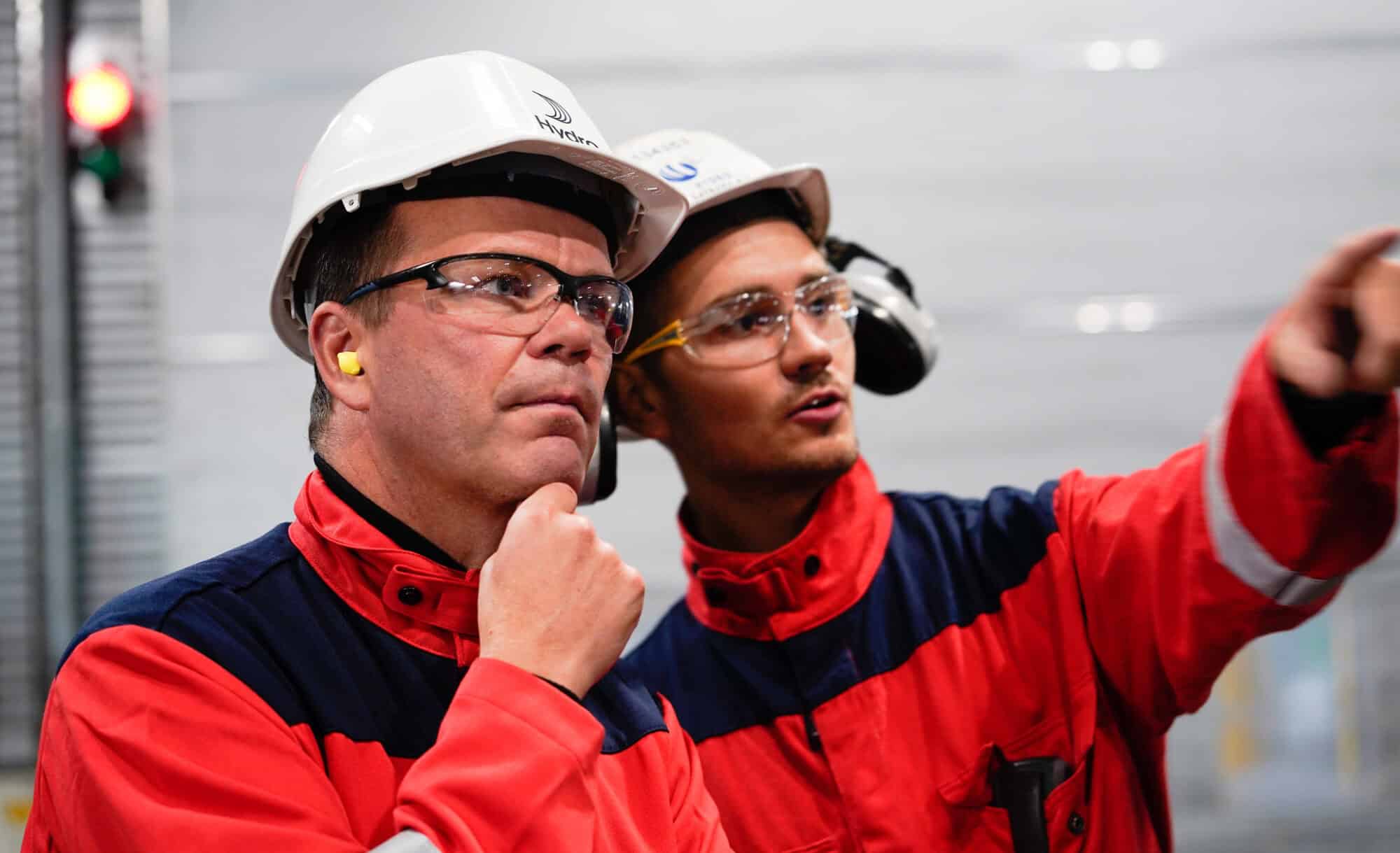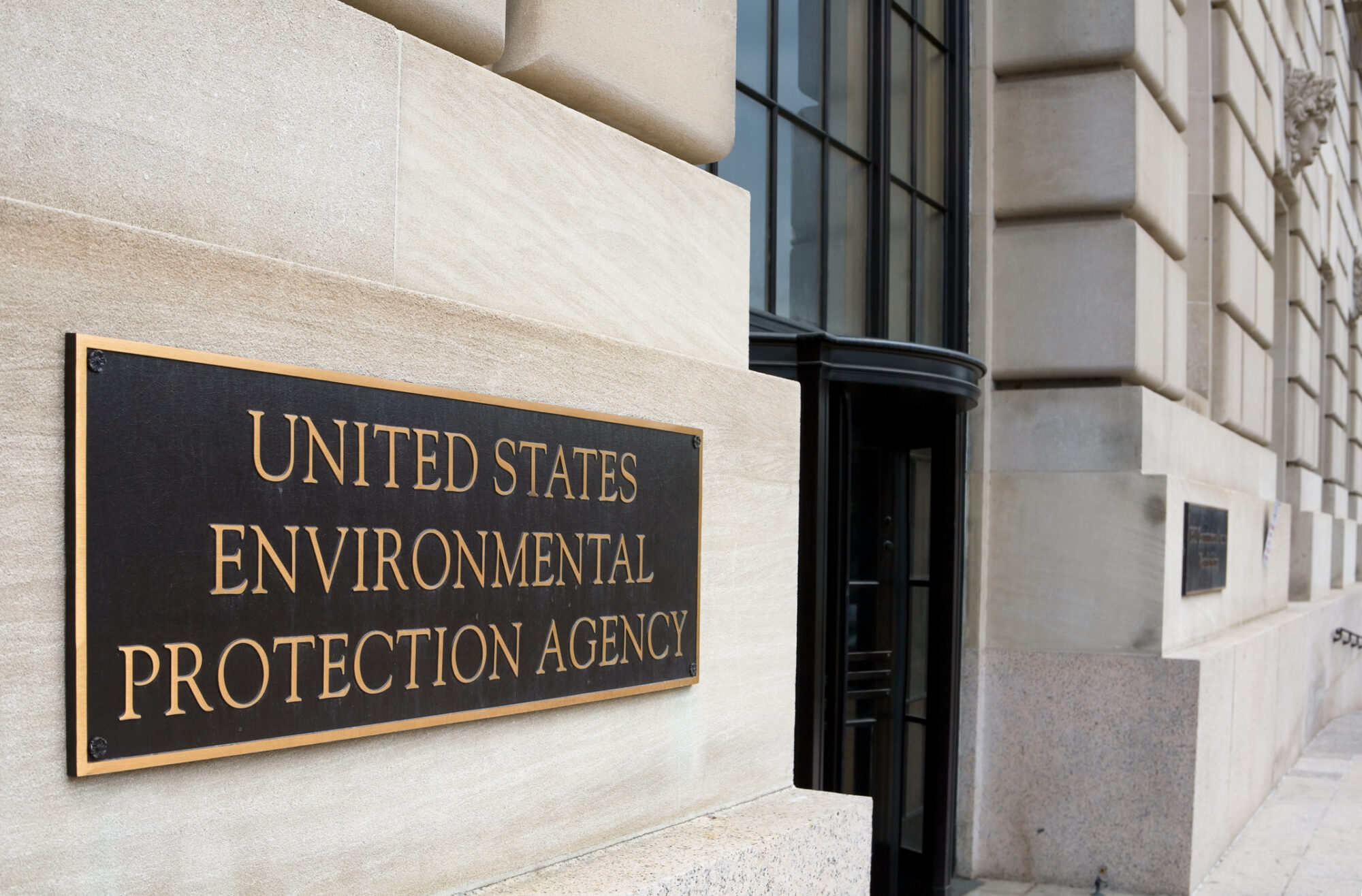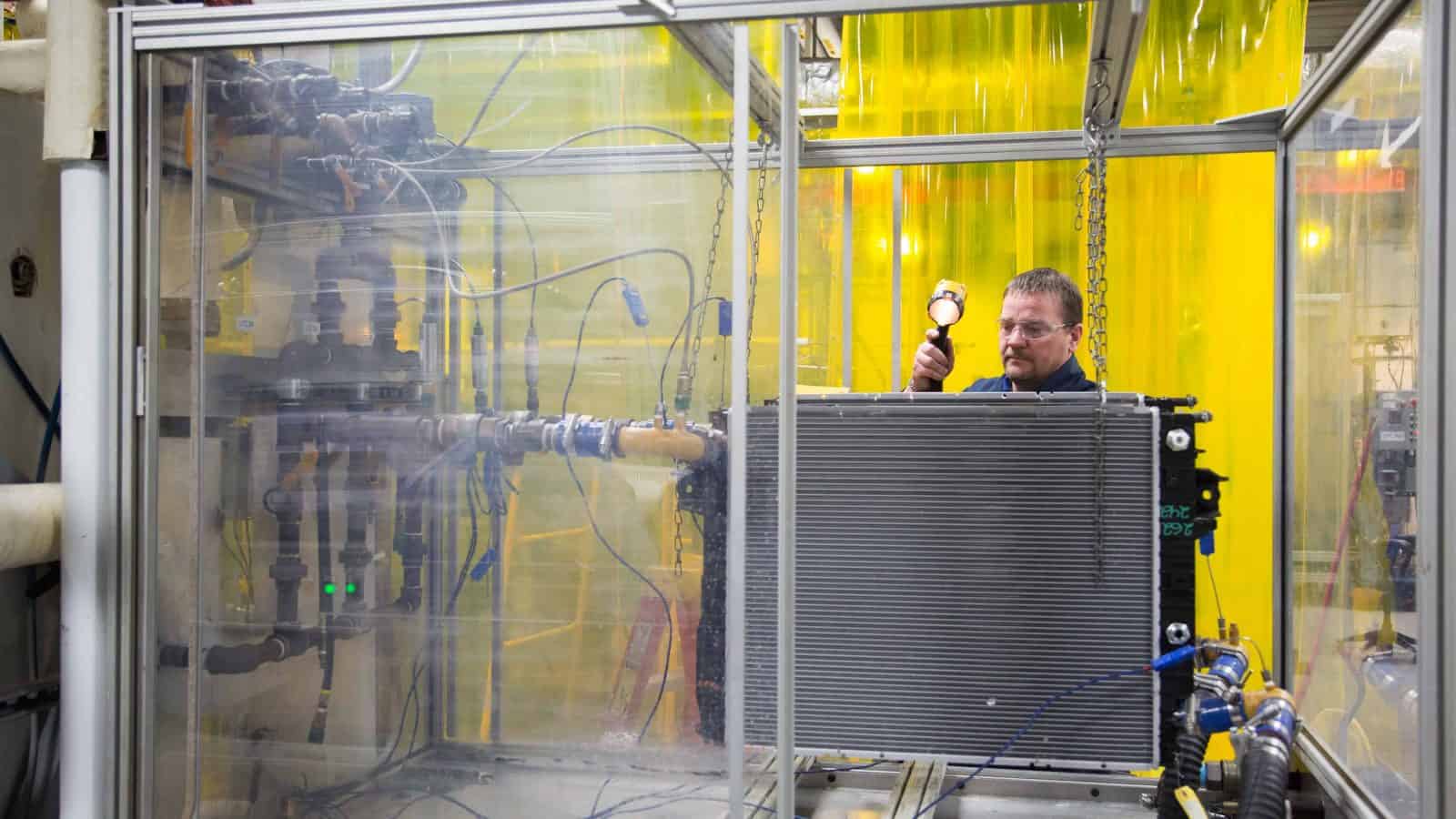In 2024, U.S. Produced More Energy Than Ever Before

The U.S. produced a record amount of energy in 2024, according to the U.S. Energy Information Administration.
What’s going on: “U.S. total energy production was more than 103 quadrillion British thermal units in 2024, a 1% increase from the previous record set in 2023. Several energy sources—natural gas, crude oil, natural gas plant liquids, biofuels, solar and wind—each set domestic production records last year.”
The details: Natural gas has been the primary source of American domestic energy production—accounting for approximately 28% of total energy production last year—every year since 2011.
- Crude “was a record 13.2 million barrels per day in 2024, 2% more than the previous record set in 2023.”
- Natural gas plant liquids, which are fuels extracted from the processing of natural gas such as ethane and propane, totaled a record 4 trillion cubic feet in 2024, up 7% from 2023 and accounting for approximately 9% of total U.S. energy production that year.
Other sources: Solar, wind and biofuels also set records in 2024.
- Solar and wind production increased by 25% and 8%, respectively, as new generating capacity was added.
- Biofuels—which comprise biodiesel, renewable diesel and ethanol, as well as other biofuels like sustainable aviation fuel—accounted for “a record 1.4 million barrels per day, up 6% from previous records set in 2023.”
- Output from geothermal declined slightly from 2023.
The NAM says: “This data is clear evidence of the strength and success of an all-of-the-above energy strategy,” said NAM Director of Energy and Resources Policy Michael Davin.
- “Given the growth of artificial intelligence and data centers, we will continue to need record levels of energy generation. By continuing down this path, we could reach our goal of U.S. energy dominance on the world stage.”
Power Markets Warn FERC of Increasing Risk of Outages

The artificial intelligence–driven rise in energy demand from the tech sector is adding more strain to the U.S. power grid, boosting the risk of outages to “new highs,” regional power market executives said at a regulatory conference this week (POLITICO Pro’s ENERGYWIRE, subscription).
What’s going on: “Grid rules developed during periods of relatively slow growth aren’t equipped for the demands of Silicon Valley’s investment in artificial intelligence, extreme weather shocks and deep national and state political divisions over energy and climate policy, grid operators told members of the Federal Energy Regulatory Commission.”
- PJM Interconnection, which has 67 million customers in the eastern U.S., forecasts a 32-gigawatt power demand increase through 2030, “of which 30 is from data centers,” CEO Manu Asthana told FERC.
- Southwest Power Pool, with approximately 19 million customers in the Great Plains states, said it projects peak demand “to be as much as 75% higher 10 years from now,” largely due to data centers and electrification.
Why the outage threat is worsening: Extreme weather events and greater use of weather-dependent energy sources such as wind and solar make “outages … 125 times more likely to happen [now] than eight years ago.”
What’s needed: C-suite leadership told regulators there are steps that can—and must—be taken to mitigate the worsening risk. These include:
- Stabilized market rules and “find[ing] that intersection between reliability and affordability that works both for consumers and suppliers, and that intersection is getting harder and harder to find”;
- “[M]uch deeper insight” into future electricity supply and demand and probabilities of extreme weather;
- More and better real-time information about the effect of dangerous storms on gas pipeline deliveries to electric turbines;
- “[S]tronger modeling of fuel and capacity performance to assess reliability risk”; and
- The establishment of an agreed-upon profile of the risks operators likely face.
Adding to the problem: Making matters worse are the vastly different climate policies between states, which put regional power markets “in an impossible position,” FERC Chair Mark Christie said at the conference.
- One possible solution: give states more responsibility for fixing grid reliability problems on their own.
The NAM says: As the NAM recently told the House’s AI and Energy Working Group, led by Rep. Julie Fedorchak (R-ND), “A reliable, resilient modern grid is required to enable the historic growth in data centers, which in turn can contribute to manufacturing growth.”
Trump Executive Order Will Speed Up Deployment of New Reactors

President Trump signed several executive orders on Friday that call for the reform of the Nuclear Regulatory Commission and will speed up the permitting of new reactors in the U.S. (CNBC).
What’s involved: “Trump said Friday the orders focus on small, advanced reactors that are viewed by many in the industry as the future. But the president also said his administration supports building large plants.”
- “We’re also talking about the big plants—the very, very big, the biggest,” Trump said. “We’re going to be doing them also.”
Going faster: Building new power plants has been a tedious effort thanks to the long licensing and regulatory approval processes.
- Yet the appetite for more nuclear power is there, thanks to the electricity demand from the data centers powering the AI revolution.
- “Three Mile Island is expected to return to service with financial support from Microsoft . . . and Alphabet and Amazon are investing in small, advanced reactors,” CNBC noted.
More uranium: The EOs also aim to boost uranium mining in the U.S. and to increase domestic enrichment and processing capacity, according to an administration official.
- In addition, the orders also “aim to speed up reactor testing at the Department of Energy’s national laboratories.”
The NAM says: “These actions mark an important and timely step toward unleashing American energy dominance safely and responsibly. Nuclear-generated power is an important part of an all-of-the-above energy strategy, which is necessary to meet the power needs of a growing manufacturing sector, and the nuclear fuel supply chain is a critical manufacturing industry that we need to bring home,” said NAM President and CEO Jay Timmons.
- “Rebalancing regulations and expediting permitting reform to unleash American energy are key pillars of a comprehensive manufacturing strategy that Congress must act on so manufacturers can grow, hire and compete—and these orders reflect that vision by reforming the licensing and permitting systems that place burdens on manufacturers.”
- “The NAM looks forward to working closely with the National Energy Dominance Council, under the leadership of Secretary of the Interior Doug Burgum and Energy Secretary Chris Wright, as well as Congress to ensure these policies translate into durable results for manufacturers.”
Manufacturers: Nuclear Energy Orders Power Up Manufacturing in America
Washington, D.C. – The National Association of Manufacturers today welcomed President Trump’s latest executive orders to expand the development of nuclear energy, streamline federal permitting and strengthen domestic fuel production. NAM President and CEO Jay Timmons issued the following statement:
“These actions mark an important and timely step toward unleashing American energy dominance safely and responsibly. Nuclear-generated power is an important part of an all-of-the-above energy strategy, which is necessary to meet the power needs of a growing manufacturing sector, and the nuclear fuel supply chain is a critical manufacturing industry that we need to bring home.
“The executive orders include measures to accelerate the licensing of next-generation nuclear reactors, open federal lands for energy infrastructure and increase domestic uranium production. Together, these actions address critical supply chain challenges and energy demands—particularly as the AI-driven economy continues to grow.
“Rebalancing regulations and expediting permitting reform to unleash American energy are key pillars of a comprehensive manufacturing strategy that Congress must act on so manufacturers can grow, hire and compete—and these orders reflect that vision by reforming the licensing and permitting systems that place burdens on manufacturers.
“The NAM looks forward to working closely with the National Energy Dominance Council, under the leadership of Secretary of the Interior Doug Burgum and Energy Secretary Chris Wright, as well as Congress to ensure these policies translate into durable results for manufacturers.”
Background:
Most recently, support for nuclear energy in the U.S. has climbed to 61% according to Gallup, reaching just one point below the all-time high in 2010. Support for accelerating the development and commercialization of both traditional nuclear energy plants as well as advanced modular reactors is vital to America’s energy future and the success of manufacturers in the U.S.
The NAM has long championed policies that drive investment in advanced nuclear power to meet rising U.S. energy demand fueled by electrification, advanced manufacturing and the surge in AI and data centers.
These include:
- Reforming the permitting and approval process to make it easier for reactor projects to locate on underused or abandoned sites;
- “Early licensing work” provisions to help deploy reactors more quickly at national security infrastructure sites; and
- A series of awards to encourage companies to develop advanced-reactor technology.
-NAM-
The National Association of Manufacturers is the largest manufacturing association in the United States, representing small and large manufacturers in every industrial sector and in all 50 states. Manufacturing employs nearly 13 million men and women, contributes $2.93 trillion to the U.S. economy annually and accounts for 53% of private-sector research and development. The NAM is the powerful voice of the manufacturing community and the leading advocate for a policy agenda that helps manufacturers compete in the global economy and create jobs across the United States. For more information about the NAM or to follow us on Twitter and Facebook, please visit www.nam.org.
FERC Advances Louisiana LNG Project

The Federal Energy Regulatory Commission has issued a new final supplemental environmental review for Venture Global’s CP2 liquefied natural gas project in Louisiana, bringing it a step closer to reality (E&E News, subscription).
What’s going on: FERC found that “the terminal and an associated compressor station wouldn’t cause ‘significant cumulative air quality impacts.’”
The project: “The CP2 facility has a nameplate liquefaction capacity of 20 million metric tons per year, but it could produce even more under peak conditions.”
- If approved expeditiously, the project could produce its first LNG by 2026, the company said last year.
- “With today’s [final environmental impact statement,] FERC has found twice-over that CP2 will have no significant air impacts,” Venture Global spokesperson Jess Szymanski said in an emailed statement to E&E News. “The project is ready to break ground and begin supplying U.S. allies with much-needed LNG as soon as the FERC Commission votes on the Final Order and issues a notice to proceed with construction.”
What’s next: The Final Order is slated for July, according to FERC’s website.
The NAM says: “LNG projects like Venture Global’s will help bolster the American economy by creating jobs here at home and enabling the U.S. to achieve energy dominance on the world stage,” said NAM Director of Energy and Resources Policy Michael Davin.
Hydro CEO: U.S. Must Reuse More Aluminum

Aluminum is “an essential part of everything we do”—so we need to recycle more of it.
That’s the message from leading global aluminum and renewable energy company Hydro, based in Oslo, Norway, whose president and CEO, Eivind Kallevik, recently sat down with the NAM to discuss the importance of the metal to the U.S.
Ubiquitous and crucial: “Construction, automobiles, [energy and technology]—you’ll find an enormous amount of aluminum in all of that,” Kallevik told us. “Going forward, it will just become increasingly important.”
An energy imperative: The U.S. has an aging electrical grid—a matter on which the NAM has long issued a clarion call—and modernizing and expanding it to meet Americans’ energy appetite will require aluminum, and a lot of it.
- “There’s going to be a huge increase in demand for electricity, especially given [the growth in construction of] data centers,” said Kallevik.
- For vehicles to become more energy-efficient, they must be lighter, and “the best way of doing that is more aluminum.”
A workhorse: One of the metal’s best qualities is its ability to withstand nearly endless reuse, Kallevik said.
- “You can recycle it infinitely. If you sort it the right way, you will be able to take it back to exactly the same state it was in in the first place.”
- Hydro—which has operations in 17 states and employs thousands of people in the U.S.—has multiple aluminum recycling facilities throughout the country, including at sites in Pennsylvania, Indiana, Illinois, Louisiana, California and Texas.
Keep more at home: “The more [aluminum] you can keep onshore, the better it is” for manufacturing, the economy in general and national security, Kallevik continued, adding that aluminum is critical in many U.S. defense applications.
- “If the U.S. kept more scrap exports onshore, we would reduce dependence on third parties” for the metal, he said.
Policy and supply chains: Because building is a heavily energy-intensive process, “energy policy is going to be increasingly important” in the coming years, Kallevik went on.
- “To protect its industries, the U.S. needs to ensure a fair regulatory framework to ensure that everybody in a global context competes on a level playing field,” he told the NAM.
- And when it comes to shoring up domestic supplies of aluminum, “to be more self-sufficient, the short-term solution for the U.S. is recycling,” he said. “Use what’s on the ground today, and for tomorrow, build capacity.”
President’s Executive Order Strengthens U.S. Manufacturing by Accelerating Permitting and Unlocking Critical Resources
Washington, D.C. – Following President Donald Trump’s executive order to accelerate permitting and expand access to critical resources for manufacturing, National Association of Manufacturers President and CEO Jay Timmons released the following statement:
“For too long, red tape and burdensome regulations have stood in the way of the basic building blocks that power manufacturing in the United States, especially mining and processing the minerals manufacturers rely on to create jobs and dominate on the world stage. The administration is addressing those barriers, making it easier for manufacturers to access the resources we need to build the future in America.
“The NAM and our members will continue to serve as a resource to the Trump administration as it takes action to secure America’s supply chains and reduce reliance on countries like China when we have resources right here at home.
“A comprehensive manufacturing strategy—one that cements America’s position as the manufacturing superpower—depends on smart permitting reforms like the ones the administration is advancing. When manufacturers in the United States can invest with certainty, they plan, hire and win—and when manufacturers win, America wins.
“The NAM has long championed expediting the permitting process as a key pillar of our competitiveness agenda. When President Trump spoke at our September 2024 board meeting, he promised to deliver on this priority, and he has kept his promise. We look forward to continuing to work with his National Energy Dominance Council, under the leadership of Secretary of the Interior Doug Burgum and Secretary of Energy Chris Wright, to Make America Great for Manufacturing Again.”
-NAM-
The National Association of Manufacturers is the largest manufacturing association in the United States, representing small and large manufacturers in every industrial sector and in all 50 states. Manufacturing employs nearly 13 million men and women, contributes $2.93 trillion to the U.S. economy annually and accounts for 53% of private-sector research and development. The NAM is the powerful voice of the manufacturing community and the leading advocate for a policy agenda that helps manufacturers compete in the global economy and create jobs across the United States. For more information about the NAM or to follow us on Twitter and Facebook, please visit www.nam.org.
Burgum Talks Taxes, Permitting and More

At an NAM-sponsored breakfast at energy conference CERAWeek in Houston on Tuesday, Interior Secretary Doug Burgum assured NAM board members that the administration has a manufacturing strategy in place, particularly regarding permitting, infrastructure development and manufacturers’ access to reliable and affordable energy.
A comprehensive strategy: In his remarks opening the event, NAM President and CEO Jay Timmons discussed the five-pillar, comprehensive manufacturing strategy that the NAM has been urging the Trump administration to implement.
- “Secretary Burgum, I just want you to know we’ve been making the case for a coordinated, comprehensive manufacturing strategy to give us the predictability and the certainty that manufacturers need to plan, to invest and to hire here in the United States, and that strategy has five pillars—goals that I know you share,” Timmons said.
- The goals are making the 2017 tax reforms even more competitive and permanent; securing regulatory certainty; expediting permitting reform to unleash American energy dominance; increasing the talent pool; and implementing a commonsense trade policy—to expand access to markets while keeping manufacturing competitive.
- Timmons warned of the dire consequences the U.S. economy and manufacturers will face if lawmakers fail to extend the 2017 tax reforms. Among them: the loss of some 6 million American jobs, according to a recent NAM–EY study.
An economic backbone: “Manufacturing, as you know, has been the backbone” of the economy, Burgum said. “President Trump ran on bringing manufacturing back to the United States. His policies are driving to do that.”
Unleashing U.S. energy: Timmons praised President Trump for his day-one lifting of the previous administration’s liquefied natural gas export permit moratorium.
- The “recent NAM LNG study found that the U.S. LNG export industry could support more than 900,000 jobs and add $216 billion to GDP by 2044,” he said.
- Said Burgum: “We are looking at everything to try to, for the first time, [have] streamlined government. … [and] it’s happening. It’s happening quickly.”
“Optimistic about the future”: The administration’s commitment to “low taxes and cutting red tape”—on which President Trump’s recently created National Energy Dominance Council is focusing—“are all things that are going to help lower your cost and create opportunities,” Burgum continued.
- “Capital is flowing to the U.S. at record levels. … I’m very optimistic about the future.”
The last word: At another event at CERAWeek, a roundtable sponsored by Natural Allies for a Clean Energy Future, Timmons summed up manufacturers’ commitments.
- “Yes, we care about developing our natural resources to power our economy, certainly through manufacturing, but it’s also about people, here in the United States and around the world,” said Timmons. “The energy that we export, that is soft power for the United States. That expands our influence. That allows us to export not only our energy, but also our values. So I think that’s very, very important for our future.”
EPA Reconsiders Dozens of Burdensome Regulations

The Environmental Protection Agency announced Wednesday it would begin a large-scale, NAM-supported review of dozens of rules and regulations, including the previous administration’s unworkable National Ambient Air Quality Standards for particulate matter and an overly burdensome power plant emissions rule (EPA).
What’s going on: In response to sustained advocacy from the NAM and manufacturers around the U.S., EPA Administrator Lee Zeldin said in a press release and Wall Street Journal (subscription) op-ed that he intends to take swift action to review and potentially rescind regulations that were hamstringing manufacturers and needlessly driving up costs across the board.
What’s in it: The NAM in December called on President Trump to reverse the regulatory onslaught of the past four years. NAM-recommended actions included in yesterday’s EPA announcement included reconsideration of the following:
- NAAQS for PM2.5: Last year, the Biden administration tightened the primary annual standard for particular matter—more commonly known as soot—to an untenable 9 micrograms per cubic meter from 12 micrograms per cubic meter. Manufacturers found to be in nonattainment of these standards will now be denied permits for new and expanded facilities.
- Power plant rules: The previous administration’s emissions regulations on existing coal-fired and new natural gas–powered power plants include an unrealistic timeline for the widespread adoption of expensive, unproven new technology; this regulation threatens grid reliability and the ability of manufacturers to receive power for their operations.
- Vehicle regulations: Current regulations of light-, medium- and heavy-duty vehicles impose costly hardships on auto manufacturers.
- Waters of the United States: The last administration had made the scope of the Clean Water Act overly broad, resulting in high costs and even slowed permitting processes.
Our view: “President Donald Trump and EPA Administrator Lee Zeldin have answered the calls of manufacturers across the country to rebalance and reconsider burdensome federal regulations harming America’s ability to compete,” NAM President and CEO Jay Timmons said in a statement picked up by The Washington Post (subscription).
New House AI, Energy Working Group Issues RFI

The newly established House of Representatives’ AI and Energy Working Group is seeking information on the increase in energy demand we can expect due to the growing use of artificial intelligence (POLITICO Pro, subscription).
What’s going on: Group lead Rep. Julie Fedorchak (R-ND)—who was North Dakota’s head utility regulator for more than a decade prior to being elected to Congress last year—discussed the new working group with us Tuesday at NAM headquarters.
- Rep. Fedorchak spoke at an event at the NAM on how the U.S. can strengthen the electrical grid, advance permitting reform and support manufacturers investing in the latest energy technologies.
- The working group issued a request for information on Monday, “invit[ing] stakeholders to provide written responses” to questions under “three pillars,” according to the RFI document.
The details: These pillars are the following:
- American Energy Dominance and AI Energy Demands: The RFI “seeks to identify strategies to secure a stable, affordable and sustainable domestic energy supply capable of powering next-generation AI infrastructure.” Subtopics on which respondents are asked to inform the working group include oil and gas, nuclear, solar, geothermal and other power production methods.
- Securing the Energy Grid: A resilient, secure electrical grid is “essential” for AI systems and the larger “digital economy,” the document says. Permitting reform, electricity generation and baseload power are possible subtopics here.
- Strategic Competition: Outpacing China: “In an era of intensifying global rivalry, ensuring American technological and energy leadership is critical.” Some of the subtopics under this pillar are manufacturing, critical minerals and chips.
Why it’s important: “To be AI dominant, we must first be energy dominant,” Rep. Fedorchak said in a statement, according to POLITICO Pro.
- “In 2024, data centers accounted for 4.3% of total U.S. power demand, and analysts predict this could climb to as much as 12% by 2030—more electricity than the entire state of Texas uses today. Yet the U.S. isn’t scaling up reliable baseload power quickly enough to support this rapid growth.”
How to respond: Responses are due by May 15 and should be emailed to [email protected].
